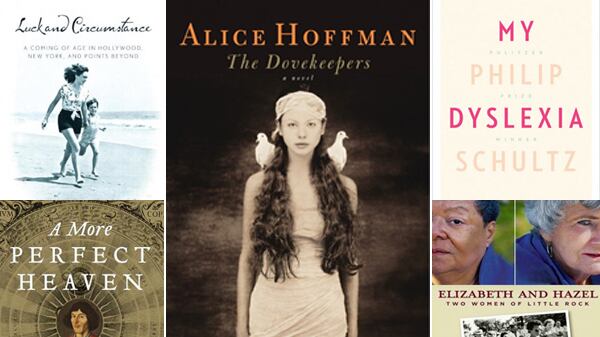Elizabeth and Hazel: Two Women of Little Rockby David Margolick
The remarkable story of a historic civil-rights photograph and the intertwined lives of its subjects.

In Elizabeth and Hazel: Two Women of Little Rock, Vanity Fair and Newsweek contributor David Margolick traces the lives of Elizabeth Eckford and Hazel Bryan Massery, the two women—one black, one white—captured in what is arguably the most iconic photograph to emerge from the civil-rights movement. Margolick explores the 1957 photo’s profound influence on its subjects and how it shaped the course of their lives since their famous encounter at Little Rock Central High School. Margolick deftly recounts Eckford’s struggle to overcome discrimination and Massery’s longing to make amends, inspiring them to reconcile in the ’60s. A strong friendship forms and then inevitably falls apart over the same misunderstandings encapsulated in photographer Will Counts’s image.
Luck and Circumstance: A Coming of Age in Hollywood, New York, and Points Beyondby Michael Lindsay-Hogg
An irresistible memoir from the director of the Tony Award-winning play The Normal Heart.

As is the case with many children of movie stars, Michael Lindsay-Hogg’s life is one worth chronicling in a memoir, if only for the great stories. But his incisive writing and ability to deftly transcribe every dramatic moment that shaped his life makes Luck and Circumstance stand out. At 71, the acclaimed director of films such as Let It Be and Brideshead Revisited looks back on his life as the son of actress Geraldine Fitzgerald and British expat Sir Edward Lindsay-Hogg, who abandoned the family when Michael was a toddler. Then there was his putative father, Orson Welles, whom everyone knew had an affair with Fitzgerald. Everyone except Michael, that is, until the rumors reached him in adolescence as he was eyeing a life in the theater. He struggles to make sense of his mother’s denial, the uncanny resemblance between Welles and himself, and other unanswered questions that haunt this marvelous coming-of-age story.
A More Perfect Heaven: How Copernicus Revolutionized the Cosmosby Dava Sobel
The bestselling author of Longitude spins a compelling narrative of scientific achievement: this time on the Copernican revolution.

Who was Copernicus? In her latest book, Dava Sobel gives us a more intimate portrayal of the revolutionary scientist than we ever learned from textbooks. He was, of course, the visionary who rightfully declared that the sun—not the Earth, as long believed—was the center of the universe. But Sobel delves deeper into the reclusive man behind the genius who refused to proclaim his theory for fear of being ridiculed. Thirty years later, Rheticus, a zealous mathematician and Copernican scholar, persuades his aging mentor to publish De Revolutionibus Orbium Coelestium. At the heart of the book is Sobel’s fictional play, And the Sun Stood Still, which imagines the fascinating relationship of the master and his disciple.
The Dovekeepers by Alice Hoffman
A spellbinding novel about four extraordinary women living in Masada after the Romans’ bloody siege of the city.

As in her best-selling novel Practical Magic, the characters in Hoffman’s latest work are strong women who possess primal female desires and, in some cases, magical powers. But unlike her previous books, The Dovekeepers is set in ancient Israel and rooted in biblical history, imbued with a sense of purpose that elevates it from fiction to literature. Based on the Romans’ murderous siege of Masada in A.D. 70, Hoffman relays the story as told by the historian Josephus, who claimed only two women and five children survived the bloody massacre. Expanding on this momentous tale, Hoffman conjures up four women—Yael, Revka, Shirah, and Aziza—each of whom came to Masada independently with her own spiritually rich, secret-riddled past to live in the city’s famous dovecotes. In her most ambitious novel to date, Hoffman tackles one of the most significant moments in Jewish history and spins years of research into a gripping, masterful narrative.
My Dyslexiaby Philip Schultz
A renowned poet chronicles his struggles with dyslexia and sheds light on the often-misunderstood condition.

How did a young boy who couldn’t read until he was 11 grow up to be a Pulitzer Prize–winning poet? It’s a question that Philip Schultz has been asked in countless interviews, but in his poignant new memoir, the poet fully addresses the seeming paradox of being a dyslexic wordsmith. Banished to the “dummy class” in school, Schultz opens up about the challenges of living with an often-stigmatized condition that plagued him as an adolescent and still torments him as an adult and parent of a dyslexic child. Yet My Dyslexia is a success story, its author living proof that one can rise above the disease and defy its so-called limitations on the brain.






